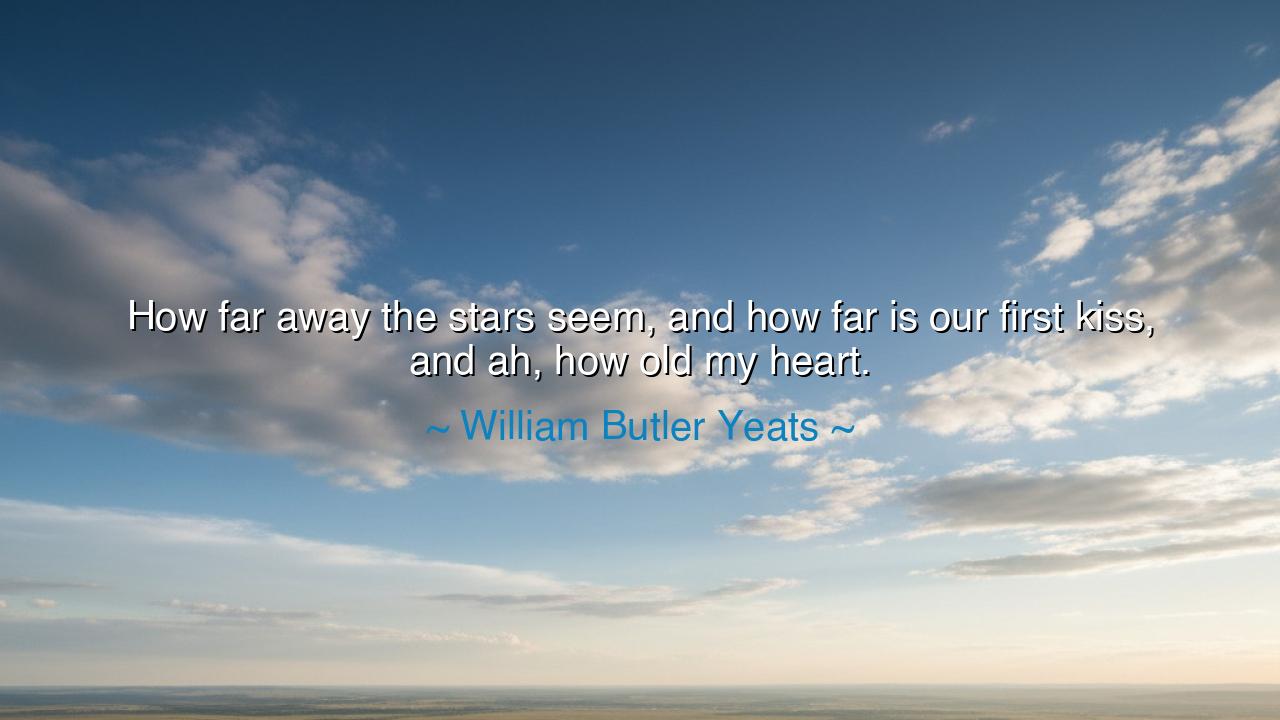
How far away the stars seem, and how far is our first kiss, and






William Butler Yeats, poet of longing and seer of hidden realms, once wrote: “How far away the stars seem, and how far is our first kiss, and ah, how old my heart.” In these words he binds together the eternal and the personal, the cosmos and the soul, reminding us that love and memory are as vast and distant as the heavens. The stars above and the first kiss of love share the same quality: they belong to the eternal past, always shining, always remembered, yet forever just beyond reach. And in the weight of this distance, the poet feels the age of the heart, worn not by years alone, but by longing, memory, and loss.
The origin of this vision lies deep within Yeats’s own life. Much of his poetry was shaped by his unrequited devotion to Maud Gonne, the muse who stirred his imagination yet never fully returned his love. For him, the memory of their closeness—of perhaps a kiss, a touch, a fleeting intimacy—was both treasure and torment. Like the stars, it shone brightly, but always at a distance. Thus, his heart grew old not with time alone, but with the weight of desires unfulfilled and memories cherished but unreachable. In this way, Yeats teaches us that the soul ages as much by longing as by years.
History offers us parallels to this truth. Consider Dante Alighieri, who saw Beatrice only rarely, and yet devoted his life and poetry to her memory. For Dante, her presence was like the stars: a light that guided his soul, though always out of reach. Their brief encounters became eternal in his verse, and yet the distance between them aged his spirit, even as it exalted him. Like Yeats, Dante discovered that the first kiss, whether real or imagined, becomes a timeless moment that defines the heart for a lifetime.
Or ponder the story of Abraham Lincoln, who in his youth loved Ann Rutledge, a love cut short by her early death. Though he went on to lead a nation and carve his name into history, the memory of Ann remained like a star in his private sky—distant, unreachable, yet always shining. Those who knew him said that a certain melancholy never left his eyes, as though his heart carried both the brilliance of that first love and the burden of its loss. In him, too, we see Yeats’s lament: the stars are far, the kiss is far, and the heart grows old in its remembering.
The deeper meaning of Yeats’s words is that love, once tasted, becomes eternal in memory. The stars are ancient lights that travel across time and space; our first moments of love are no different. They shine forever in the mind, untouchable yet illuminating. And with each passing year, the gap between the present and that remembered radiance grows wider, until the heart feels its age not in years but in the weight of distance. Thus Yeats captures the paradox of love: it gives eternal youth in its joy, but it ages the heart in its loss.
The lesson, O seekers of wisdom, is twofold: first, to cherish love in its moment, for once it has passed, it will shine only in memory, like a star too distant to touch. And second, to live with courage in the face of that distance, not to let the weight of absence turn the heart bitter, but to let memory become light for the soul’s journey. For even if the stars are far, they still guide us through the night.
Practical wisdom follows: do not wait to speak your love, to give your affection, to live fully in the embrace of another. For the day will come when what is near will become distant, and what is fresh will become memory. Let your heart not grow old too soon with regret, but grow wise by gratitude. And when you look upon the stars, remember that they, too, are symbols of what you have loved—distant, yet never lost, shining still across the reaches of time.
Thus Yeats’s words endure as both lament and counsel: “How far away the stars seem, and how far is our first kiss, and ah, how old my heart.” He teaches us that love is both timeless and fleeting, that the memory of its first light is both joy and sorrow, and that the true task of life is to carry that light bravely, even as the heart grows old beneath its weight.






AAdministratorAdministrator
Welcome, honored guests. Please leave a comment, we will respond soon